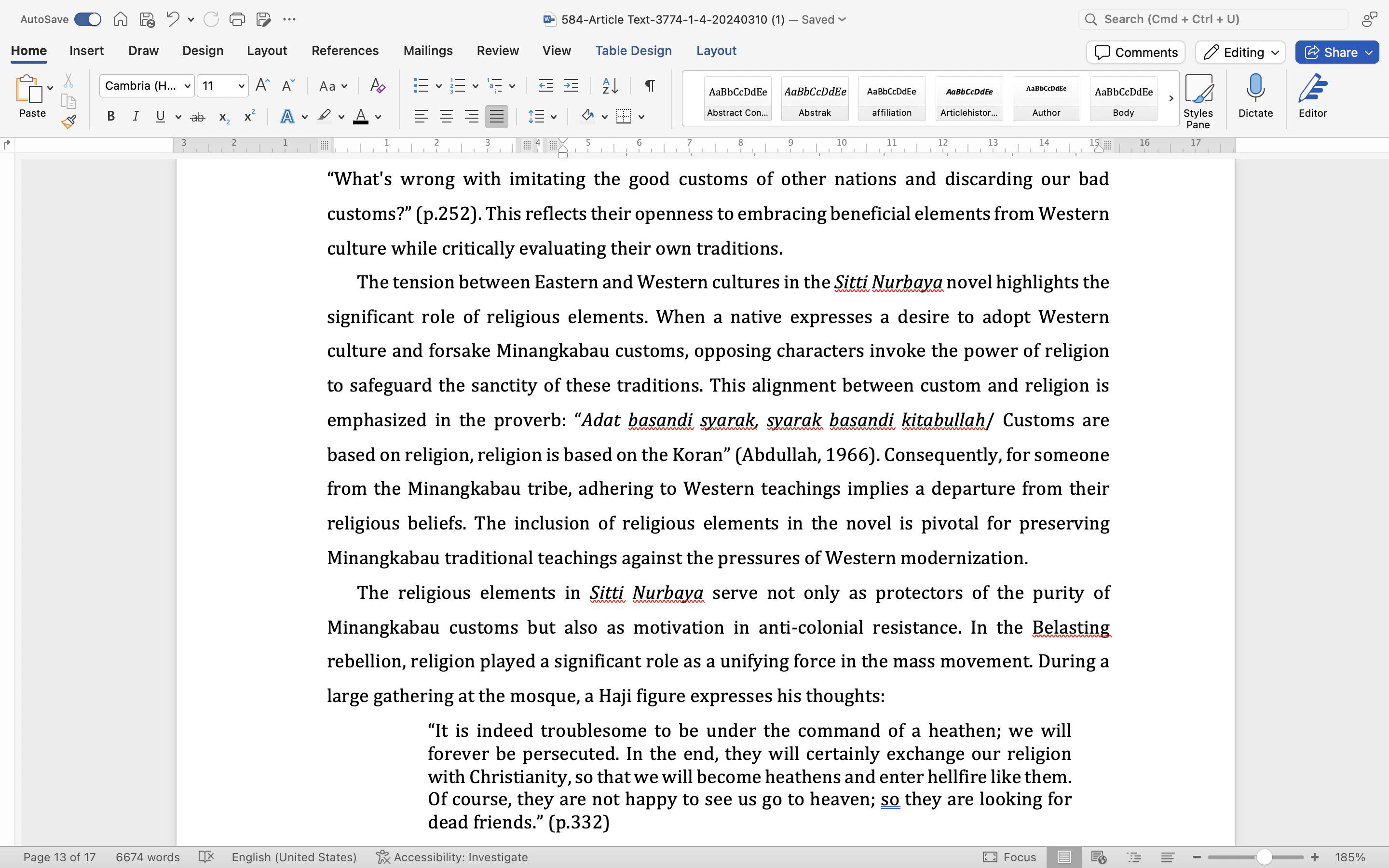Guerrilla Resistance: Sitti Nurbaya and Balai Pustaka’s Censorship
DOI:
https://doi.org/10.26555/bs.v44i1.591Keywords:
Sitti Nurbaya, Balai Pustaka, Censorship, Cultural HegemonyAbstract
Censorship, a tool of cultural hegemony often employed by colonizers, was practiced by the Dutch colonials in the Dutch East Indies through the people's reading commission or Balai Pustaka, as evidenced in the Nota Rinkes, which prohibited literary works with subversive political content, religious sentiments, and immoral themes. This study explores the content of the novel Sitti Nurbaya, a prominent publication from Balai Pustaka, using a postcolonial approach and Gramsci's theory of cultural hegemony as analytical tools. The findings reveal that Sitti Nurbaya contains elements of progressive politics through the Belasting riots, intense religious sentiment in defense of Adat teachings, and characters with flawed morals. Consequently, it is concluded that Sitti Nurbaya managed to circumvent Balai Pustaka's censorship and functioned as an organic intellectual, sparking anti-colonial awareness.
References
Anwar, S. (2020). Pendidikan formal dalam novel-novel Balai Pustaka: Analisis wacana kritis. Caraka: Jurnal Ilmu Kebahasaan, Kesastraan, dan Pembelajarannya, 6(2), 1-18.
Arif, R. (2020). Sejarah islamisasi Minangkabau. Indonesian Journal of Islamic History and Culture, 1(2), 122-137.
Artawan, G. (2016). A comparative study on indigenous female sexuality body in the novels at Balai Pustaka and Tionghoa descent. International Journal of Linguistics, Literature and Culture, 2(4), 162-171.
Christyawaty, E., & Susilowati, N. (2010). Jejak budaya musyawarah, bentuk demokrasi masyarakat Minangkabau. Berkala Arkeologi Sangkhakala, 13(26), 188-203.
Djurip, Anwar, S., & Getri, A. R. (1996). Kajian naskah pemimpin ke syurga dan syair perang kamang yang kejadian dalam tahun 1908. Departemen Pendidikan dan Kebudayaan.
Dobbin, C. (1998). Islamic fervour as a manifestation of regional personality in colonial Indonesia: The Kamang area, West Sumatra, 1803-1908. Archipel, 56(1), 295-317.
Fatimah, S. (2022, December). Siti Manggopoh: Female Warriors From The Coastal Land of Minangkabau in The 1908 Balasting War. In Social Studies Conference Proceedings (pp. 174-196).
Fitzpatrick, E. B. (2001). “Balai Pustaka in the Dutch East Indies: Colonizing a Literature”. In Changing the Terms: Translating in the Postcolonial Era, Simon, S., & St-Pierre, P. (eds). 113-126. University of Ottawa Press.
Fogg, K. W. (2020). Indonesia's Islamic revolution. Cambridge University Press.
Foucault, M. (1972). The archaeology of knowledge (Translated by AM Sheridan Smith). Pantheon Books.
Gouda, F. (2008). Dutch culture overseas: Colonial practice in the Netherlands Indies, 1900-1942. Equinox Publishing.
Gramsci , A. (1971). Selections from the prison notebooks. Trans. and ed. Q. Hoare and G. N. Smith. International Publishers
Hartley, W. J. (1987). Hegemony and Cultural Politics: The praxis of Gramsci's Prison Notebooks. Socialism and Democracy, 3(2), 35-53.
Harun, J. (2004). “Bustan al Salatin, the garden of kings: a Universal history and adab work from seventeenth-century Aceh.” Indonesia and the Malay World 32 (92):21–52.
Isa, Z. (1972). Printing and publishing in Indonesia: 1602-1970. Disertation. Indiana University.
Iswanto, S., Kusnafizal, T., Kamza, M., & Haikal, M. (2022). Minangkabau migration to Tanah Gayo, Aceh: History, factors, and impacts. ETNOSIA: Jurnal Etnografi Indonesia, 7(1), 29-41.
Jedamski, D. (1992). Balai Pustaka: A colonial wolf in sheep's clothing. Archipel, 44(1), 23-46.
Johns, A. H. (1979). Cultural options and the role of tradition: a Collection of essays on modern Indonesian and Malaysian literature. ANU Press.
Jung, D. (2010). "Islam as a problem": Dutch religious politics in the East Indies. Review of Religious Research, 288-301.
Kuitert, L. (2021). Balai Pustaka and the politics of knowledge. Lembaran Sejarah, 17(1), 2-17.
Kurniawan, E. (2006). Pramoedya Ananta Toer dan sastra realisme sosialis. Gramedia Pustaka Utama.
Lionar, U., Mulyana, A., & Yulifar, L. (2020). Plakat Panjang Hingga Perang Kamang: Gerakan Rakyat Minangkabau Menentang Pajak Kolonial Belanda. Historis: Jurnal Kajian, Penelitian dan Pengembangan Pendidikan Sejarah, 5(2), 113-122.
Pollack, D., & Rosta, G. (2017). Religion and modernity: An international comparison. Oxford University Press.
Rusli, M. (2018). Sitti Nurbaya: Kasih tak sampai. Balai Pustaka.
Saidi, H. (2014, July 22). Realita Perang Kamang 15 Juni 1908. Retrieved November 19, 2023, from Pemerintah Kabupaten Agam website: https://www.agamkab.go.id/Agamkab/detailkarya/505/realita-perang-kamang-15-juni-1908.html
Setiadi, H. F. (1991). Kolonialisme dan budaya: Balai Poestaka di Hindia Belanda. Jurnal Prisma, 10, 23-46.
Setiadi, H. F. (2007). Politik, bacaan dan bahasa pada masa pergerakan suatu studi awal. Thesis. Universitas Indonesia.
Siegel, J. (2014). Victory without surrender: The jihad in Aceh. Archipel, 87(1), 29-62.
Sulistyo, H., & Sartika, E. (2020). Bumiputra Author’s Resistance toward Political Hegemony and Canonization of Balai Pustaka in the Novel Hikayat Kadiroen and Student Hidjo. LITERA, 19(2), 191-209.
Sutherland, H. (1967). Tempo Doeloe and Pudjangga Baru: Aspects of social and intellectual life in twentieth-century Batavia, focussing on the indonesian community. ANU Press.
Taum, Y. Y. (2014). Diskursus batjaan liar: Kajian terhadap dua sastrawan liar dalam periode 1900-1933. Jurnal Penelitian, 17(2). 130-139.
Tickell, P. G. (1982). ‘Good books, bad books, banned books: Literature, politics and the pre-war Indonesian novel’. Thesis. Monash University, Melbourne.
Yamamoto, N. (2019). Censorship in Colonial Indonesia, 1901–1942. Library of the Written Word, Volume: 75. Brill/ Leiden.
Young, K. (1994). Islamic peasants and the state: the 1908 anti-tax rebellion in West Sumatra. Yale Center for International and Area Studies, Yale University.

Downloads
Published
Issue
Section
License
Copyright (c) 2024 Muhammad Adek, Nesa Riska Pangesti, Siska Miga Dewi

This work is licensed under a Creative Commons Attribution-ShareAlike 4.0 International License.

1.jpg)






